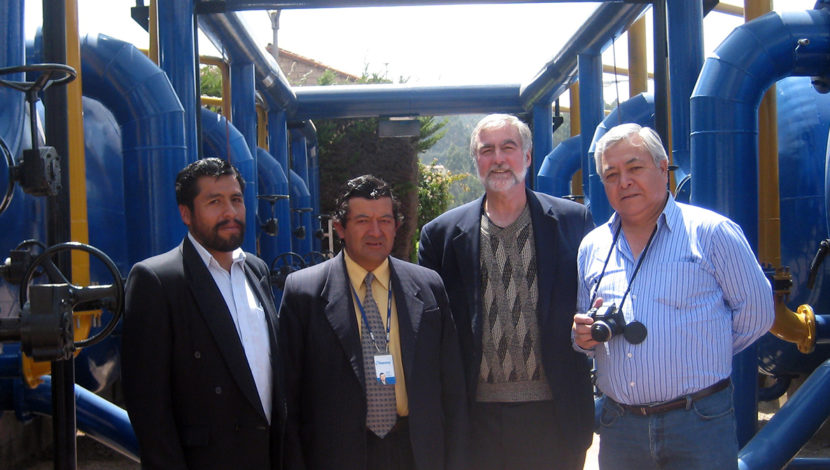The Unitarian Universalist Service Committee advances human rights through grassroots collaborations.
Water Is Life

December 4, 2008
Across Peru, water advocates are raising their voices against privatization with the help of a bright blue mascot shaped like a water drop, called La Gotita (go-Tea-ta). This type of community organizing has been necessary in Peru since 2003, when the Peruvian government began instituting water privatization.
Like many countries, Peru turned to international financial institutions and foreign aid to modernize and extend its water services. But the funding it received from the Inter-American Development Bank came with a condition: Peru must privatize its publicly owned water services.
When Peru’s loan was finalized, privatizations in Argentina and Bolivia had already caused social unrest in major urban areas as ordinary people faced a deterioration of services and cost increases. To prevent similar unrest, the Peruvian government decided to roll out privatization in phases, in smaller municipalities. The cities of Chiclayo, Huancayo, Lambeque, Piura, and Tumbes were slated for privatization.
But local governments that signed contracts with the central government and private operators ran into trouble immediately. One of the policies they put into place was to decertify the union that represents public workers, the Federation of Water and Sanitation Workers of Peru (FENTAP). The water utilities fired FENTAP members and organizers and hired unskilled laborers to replace workers who had served their communities for decades.
In response, FENTAP organized a grassroots campaign made up of Agua y Vida (Water and Life) coalitions, which include environmental groups, union members, consumers, and faith communities. It also printed a comic book and a magazine to inform people of the importance of protecting water as a public good.
|
Then, FENTAP went a step further. It developed a new model for modernizing the water and sanitation sector, which integrates the sustainable use of natural resources, public control, and citizen participation – all based on implementing the human right to water. FENTAP also proposed national legislation to implement the human right to water and ran union recertification campaigns.
Said Luis Isarra Delgado, sub-secretary general of FENTAP, “People now know FENTAP is a workers’ organization that is not just defending labor rights, but also working so that the laws of Peru will have water as a human right.”
FENTAP’s women members have been at the forefront of these efforts. While making up just 25 percent of the membership, women represent most of the governing board and on-the-ground organizers.
UUSC is providing FENTAP with additional funding to hold workshops for Agua y Vida coalitions and local governments on the human right to water and FENTAP’s proposal for responsible modernization.
FENTAP’s work has begun to pay off. In Tumbes, the only municipality to be privatized, an Agua y Vida coalition partner challenged the privatization in court. It argued that the contract was illegal, citing the constitutional protection of water resources from the local Tumbes River. (The constitution extends this protection to the Tumbes because it is an international river, shared by both Peru and Ecuador.) The judge agreed, returning his decision in July 2008; though, with appeals, the final decision is still pending.
But even before the judge’s ruling, the mayors of Tumbes had withdrawn from the privatization proposal, stating that they had been misinformed by the central government and the private contractor. And in a victory for labor rights, workers in Tumbes recertified the local FENTAP union.
In Piura, dissent by the community and elected officials halted the privatization project. However, Piura’s new mayor, along with the national government, is ramping up efforts to bring other areas under privatization.
UUSC’s support has been critical to all of these efforts.
FENTAP tells us that UUSC funding has made the campaign possible. But with the rise in prices from inflation and the devalued dollar, seed funding from UUSC is losing ground just when FENTAP’s efforts are having an impact. At the same time, the central government is cracking down on peaceful public protest – warrants have been issued for the arrest of over 1,300 people who marched against privatization.
Support is needed now more than ever!
 FENTAP developed this comic book to educate people about water privatization issues and to alert them to what was happening with the water services in their communities.
FENTAP developed this comic book to educate people about water privatization issues and to alert them to what was happening with the water services in their communities. 
